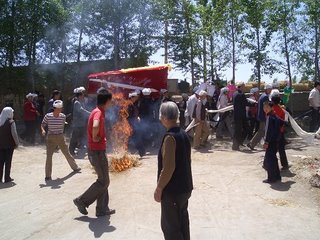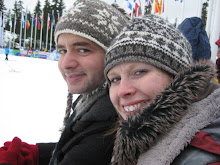 We had Wednesday-Friday off from school this week, because the students had a "sports meeting"; three days of competition in things like running, long jump, and my favorite, the slow bicycle race, which was done in teams and apparently took 45 minutes. Other than the slow bicycle race my students weren't really involved, and I didn't hang around the field too long. I was also given the usual run-around in the school's attempts to get me involved. Wednesday morning I was told I was to compete in basketball Thursday morning by the Foreign Affairs Department. After five minutes passed, I was called again and told that she was mistaken and in fact I had to come immediately to the gym to compete. After getting out of my pajamas and rushing to the gym I was informed that sure enough, she was mistaken and it was still Thursday morning, but I was meant to compete in the boomerang in the afternoon. Surprised that the school not only knew what a boomerang was but owned one and for some reason wanted me to compete in it, I showed up, only to see the gym was securely locked and no one was around. Thursday morning I woke up early to compete in basketball at 8am, and in a shocking turn of events, the gym was locked and no one was there.
We had Wednesday-Friday off from school this week, because the students had a "sports meeting"; three days of competition in things like running, long jump, and my favorite, the slow bicycle race, which was done in teams and apparently took 45 minutes. Other than the slow bicycle race my students weren't really involved, and I didn't hang around the field too long. I was also given the usual run-around in the school's attempts to get me involved. Wednesday morning I was told I was to compete in basketball Thursday morning by the Foreign Affairs Department. After five minutes passed, I was called again and told that she was mistaken and in fact I had to come immediately to the gym to compete. After getting out of my pajamas and rushing to the gym I was informed that sure enough, she was mistaken and it was still Thursday morning, but I was meant to compete in the boomerang in the afternoon. Surprised that the school not only knew what a boomerang was but owned one and for some reason wanted me to compete in it, I showed up, only to see the gym was securely locked and no one was around. Thursday morning I woke up early to compete in basketball at 8am, and in a shocking turn of events, the gym was locked and no one was there.On Wednesday, after teaching a student "Jingle Bells" on the guitar (they adore this song in China) and generally doing nothing, Andrew invited me to have dinner with him and two of his Chinese friends, a young man who owns a computer school me and Andrew were volunteered to give one lesson in last week and his wife. Some people see the foreigners as a curiosity or a means to practice English, but they seemed quite genuine in their friendliness and I liked them a lot, despite being able to participate in little of the conversation.
The husband invited us to a relative's funeral on Thursday, which was to be one of the most memorable things I've seen here so far. In the morning me and Andrew had the chance to ride their motorbikes to his parent's home, a wonderful Chinese home of the traditional one-story variety, with a courtyard, donkeys, and few signs of modernity. Now that I work with a Peace Corps volunteer and have met several others, I'm glad I didn't join; they are doing the same thing as me but with loads of bureaucratic, lawsuit-fearing restrictions like getting kicked out if you ride a motorbike or even a bicycle without a helmet, and of course less pay and travel opportunities. Literally the only person who wears a bicycle helmet in Zhangye is the Peace Corps teacher at the Medical College.
We didn't join the funeral procession until around noon. At this time, the casket was being carried by family members to the gravesite, surrounded by grieving relatives in white hats and trumpet players who kept up a loud, dischordant musical accompaniment. The casket was draped in red, and led by long white cloths in front. There was also a fire set on the side of the road, and large colorful decorations I have often seen in stores but didn't know the purpose of.
At the gravesite, several men lowered the casket into the grave, and when it was ready, everyone around the grave began madly throwing or shoveling dirt onto the casket while the immediate family wept loudly on their knees nearby. The trumpets continued throughout, quite loudly and now with a drum, and rounds of fireworks were set off. Once there was a tall mound of dirt over the grave, yellow paper was secured to the top, the colorful decorations were set on fire along with some paper puppets, and wine and baijiu were poured around the grave as we took our leave. Overall, it was not quite as solemn and certainly not as quiet as a Western funeral. Many of the people attending were in good spirits and wanted to meet me and Andrew, and we were encouraged to take pictures. It was difficult to find out what the meaning of everything was as it was happening, but from what I've found out the Chinese are intensely afraid of ghosts and the music and noise are meant to keep away bad spirits. Red is the color of luck and joy and only used in funerals in which the person died after a long life. There were paper models of a house and car in the procession, which represented the person's wealth in life. And although the grieving from the immediate family seemed pretty genuine, in any case they are obligated to make a public display of their grief. I know there are more traditions before and after the funeral which we didn't see, and from what I've seen in Chinese movies weddings in Imperial times were extremely elaborate. It was an interesting chance to take part in real Chinese life, and definitely Andrew's doing; I don't understand the teachers that come to China and don't bother with learning the language, as this more than anything leads to the most memorable experiences.

No comments:
Post a Comment